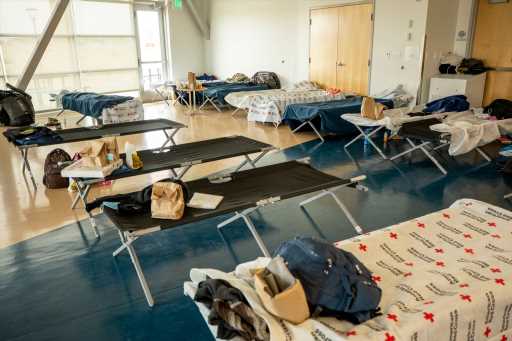Denver officials estimate that once all outstanding costs are accounted for, the total bill for providing shelter for the thousands of migrants who have arrived in the city from the southern border in December will be $3 million.
At the rate at which the migrants continue to arrive — another 166 came Thursday night into Friday bringing the total number of arrivals since Dec. 9 to nearly 3,000 people, according to the latest city update — there is little reason to believe those costs will shrink significantly in the new year.
“Right now, we’re continuing the posture we are in through the end of January. And that’s what we are planning for as a city,” said Mikayla Ortega, a spokeswoman for the city’s emergency management office.
That means providing emergency shelter, food, toiletries and other essentials for people sleeping in city-owned facilities. Right now, two city rec centers are being used for overnight shelters, one has been set up as a welcome center for new arrivals and another civic building has been designated as an overflow shelter for migrants at least through Sunday, Ortega said. City officials have asked news organizations not to identify the facilities being used out of concern for the safety and privacy of those staying there.
Budgeting for what comes next is nearly impossible.
“The costs associated with it are also an unknown,” Ortega said. ” Until we know how many are going to come and how we can get them to the next stage on their journey, we won’t have a firm answer on that.”
The influx of migrants has overlapped with a string of dangerous winter storms this month that further strained the city’s shelter system. That included a blast of arctic air that required the city to open the Denver Coliseum as an emergency shelter for four days just before Christmas. That arrangement was largely paid for by the American Red Cross, according to the city’s finance department. Not so for the migrant crisis.
The city’s estimated $3 million expenditures cover a handful of broad categories, including staffing, transportation including bus tickets for migrants with destinations outside metro Denver and food, city officials said.
The city has offered positions to more than 100 people to staff its shelters so far, Ortega said. Of those, more than half have accepted. They are classified as temporary employees.
That number will grow. The city is looking to add case workers that would be focused on helping migrants that don’t have destinations outside the city figure out their next steps here.
“We want to help these people directly figure out Plan B … and how we can help them integrate into the country in a longer-term way,” Ortega said.
The city has largely drawn the funding needed for the emergency shelters from its general fund. That is the plan going forward but the city is also hopeful it will get some federal and state relief after Mayor Michael Hancock declared the migrant situation an emergency earlier this month.
The state’s department of local affairs has already agreed to reimburse Denver $1.5 million in expenses but that grant must still go through a City Council process before its approved, officials said. A $2.5 million pot of federal American Rescue Plan Act funding has been set aside to support services for migrants, Ortega said, but the money will be divided up statewide, not go entirely to Denver.
The city is also working as fast as it can to find nonprofit partners or other government entities that can house the migrants both in the short term and long term, Ortega said. Housing between 1,400 and 1,500 people per night in a combination of city-owned facilities and facilities run by partners is viewed as unsustainable. Mayor Hancock described Denver’s network of support as being at its breaking point at a press conference last week.
“We’re looking at any and all options that we possibly can to ensure that there is not a humanitarian crisis on the streets of Denver,” Ortega said.
The American Friends Service Committee has been one of the city’s partners in addressing the needs of migrants. The organization welcomed a busload of 50 migrants from El Paso, Texas this fall and helped 21 of them get resettled in the Denver metro area while helping the rest on to other destinations. It was preparing to welcome another 50 this month when it redirected its efforts to serving the people already arriving here, program director Jennifer Piper said.
The organization filled up 150 daytime volunteer slots to support the migrants it has been sheltering this month and got 19 volunteers to provide transportation, Piper said. On Friday, she got texts from four more people looking to donate material goods they had gathered from their families.
That strong drive to volunteer and help will be needed going forward, Piper predicted. Climate change, conflict and economic inequality are leading to mass migration around the world and the word appears to be out about Denver.
“I think Denver is on the map and we’ll continue to receive people and we’ll need everybody in (the) community to be a part of welcoming in a way that respects people’s human dignity and facilitates those without loves ones become Coloradans in the long term,” she said.
Source: Read Full Article
